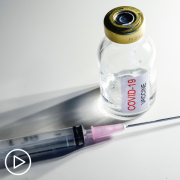When Should Advanced Prostate Cancer Patients Consider a Clinical Trial?
When Should Advanced Prostate Cancer Patients Consider a Clinical Trial? from Patient Empowerment Network on Vimeo.
Where do clinical trials fit into a prostate cancer treatment plan? Dr. Rana McKay shares her perspective on when patients should consider trial participation, as well as the benefits of joining a trial.
Katherine Banwell:
When should a patient consider a clinical trial as a treatment option?
Dr. Rana McKay:
So, I generally think that a patient should consider a clinical trial at almost every juncture that a – a clinical decision is being made. I think sometimes there’s this misperception that, “Oh. Clinical trials should only be utilized when I don’t have any other options.” Where, in fact, I would say clinical trials should be an option to discuss every single time a treatment is being changed. Because you know the ultimately the goal is to make sure patients are as I said, living longer and living better and, you know, making sure that clinical trials are an option on the table at every juncture is really a key step in that process.
Katherine Banwell:
What are the benefits of being part of a clinical trial?
Dr. Rana McKay:
So, I think there’s a lot of benefits. I think, you know, for patients with advanced disease it may provide access to drugs that they otherwise not necessarily have access to. So the standard of care therapies you know, we can prescribe those at any juncture. They’re standard of care. But clinical trials really offer an opportunity to experiment with another agent and doesn’t necessarily take away from the standard of care options.
I think the other thing is you know, I think a lot of patients with advanced prostate cancer, they – want to give back to the community. They want to leave a legacy. They want to contribute to the science. They want to be a part of that mission to make tomorrow better than today for men with prostate cancer, and I think participating in clinical trials can really help achieve that goal and also benefit the individual as well.
Katherine Banwell:
What about emerging treatments? Are there any that patients should know about?
Dr. Rana McKay:
Absolutely. So, there’s a lot of treatments that I think are currently undergoing extensive testing. There’s additional targeted therapies, for example, CDK46 inhibitors that are being tested broadly in the hormone-resistant space and the newly diagnosed setting. There’s also AKT inhibitors. There are other targeted therapies that are being tested. There’s novel hormonal treatments that target resistant pathways like the antigen receptor degraders. There’s a slew of immunotherapy options cell therapy, bi-specific antibodies that are also being tested. So, there’s a lot of really exciting and novel treatments that are looking at overcoming resistance for people with advanced disease.













